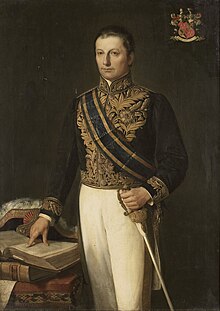Cornelis Theodorus Elout | |
|---|---|
 Cornelis Theodoor Elout by Andries van den Berg | |
| Commissioner-General of the Dutch East Indies Serving with Godert van der Capellen, Arnold Adriaan Buyskes | |
| In office 19 August 1816 – 16 January 1819 | |
| Preceded by | Newly created |
| Succeeded by | Abolished |
| Minister of Finance[1] | |
| In office 1 May 1821 – 30 March 1824 | |
| Minister of Industry and Colonies[1] | |
| In office 30 March 1824 – 5 April 1825 | |
| Minister of the Navy and Colonies[1] | |
| In office 5 April 1825 – 1 October 1829 | |
| Personal details | |
| Born | Cornelis Theodorus Elout 23 March 1767 Haarlem, Netherlands |
| Died | 3 May 1841 (aged 74) The Hague Netherlands |
| Spouse |
Henriette Josina van Eijbergen
(m. 1794) |
| Children | Pieter Jacob Elout van Soeterwoude Suzanna Sara Elout Jacoba Petronella de Bruijn Prince |
| Parents |
|
| Residence | Voorlinden |
| Education | doctor juris |
| Alma mater | Leiden university |
| Profession | attorney |
| Awards | Knight Grand Cross of the Order of the Netherlands Lion |
Cornelis Theodorus Elout (Haarlem, 22 March 1767 – The Hague, 3 May 1841) was a Dutch statesman. As Commissioner of the Dutch East Indies he instituted the landrente tax system in the Dutch East Indies in 1816, and in 1819 promulgated the new Regeringsreglement for that colony together with his colleagues Godert van der Capellen and Arnold Adriaan Buyskes, while also reforming the coinage. After his return to the Netherlands he served as Minister of Finance, Industry, Colonies, and the Navy. He was instrumental in founding the Nederlandsche Handelsmaatschappij. He opposed the introduction of the Cultuurstelsel in the East Indies, but was overruled, and resigned in protest.